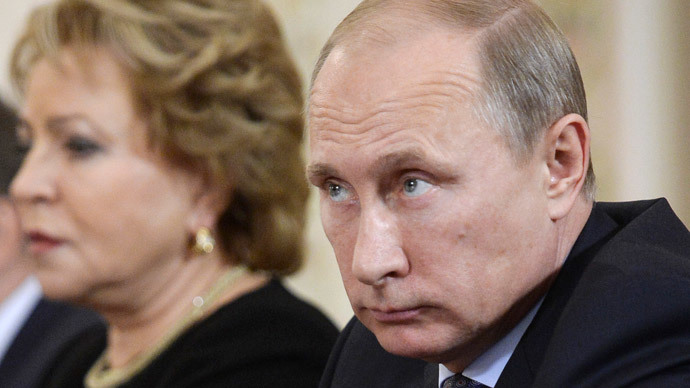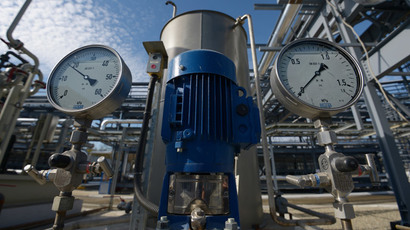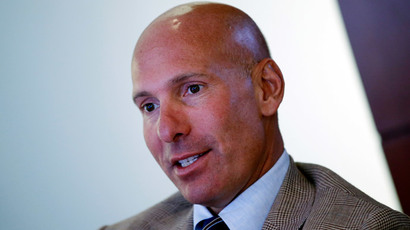US seeks to create economic cooperation for its own benefit - Putin on TPP

The Trans Pacific Partnership (TPP) is just “another attempt” by the US to create regional economic cooperation that mainly Washington would benefit from, Russian President told Chinese media ahead of his visit to the Nov. 10-11 APEC summit in Beijing.
Vladimir Putin gave an interview to leading Chinese media outlets in the run-up to his visit to Beijing, where he will take part in the Nov. 10-11 APEC Summit.
Question:The next APEC Summit will be held soon in Beijing. How does Russia view the role of this association? What does the Russian side expect from this meeting? In your opinion, how can Russia and China consolidate their cooperation within the framework ofthis Forum contributing to the peace, stability and prosperity of the Asia-Pacific region?
Vladimir Putin: APEC’s progressive development during a quarter of a century has persuasively demonstrated the relevance of this authoritative association format, a platform to agree upon common “rules of the game” in the trade and economic sphere in the APR.
It is worth noting that all the decisions reached within the framework of the Forum are adopted on the basis of the principles of mutual respect, accommodation of the interests of each other, which reflects the spirit of APEC. Under the current conditions, when some countries prefer to act on the international arena using methods of political, economic and often even coercive pressure, the role of APEC as an effective coordinating mechanism for building a new regional architecture is indispensable.
Russia actively participates in APEC activities. The Full-scale participation of our country in the regional integration processes contributes to the development of the national economy and social sphere, to the development of the regions of Siberia and the Far East.
The next meeting of the APEC leaders during 10‑11 November in Beijing will definitely be one of the key APR events of the year. As Chairman of APEC in 2014, China has prepared a huge package of initiatives. For example, a road map towards an Asia-Pacific free-trade zone is to be adopted. A plan providing specific measures aimed at promoting comprehensive coherence within the region, innovative development and structural reforms, has been elaborated.
I would like to stress the consistency of the current agenda with the issues that we proposed for discussion in Vladivostok in 2012. I think that it demonstrates that Russia and China are both interested in the common development of the region in order to promote comprehensive, sustainable and innovative growth.
We intend to pursue our traditionally close, constructive cooperation with the President of the People’s Republic of China, Xi Jinping, during the future discussions, including in the implementation of the Summit decisions. I am convinced that the APEC leaders meeting in Beijing will make a great contribution to the further consolidation of an equal and mutually beneficial partnership in the region.

Question:Currently, Russian-Chinese relations are particularly dynamic. The sides have made a significant breakthrough in cooperation in the natural gas industry and have carried out successful activities in the context of the Youth Friendly Exchanges years. What is your assessment of the progress of Russian-Chinese ties at this stage? What steps is the Russian side ready to take in order to deepen its comprehensive strategic cooperation and partnership with China?
Vladimir Putin: Strengthening ties with the PRC is a foreign policy priority of Russia. Today, our relations have reached the highest level of comprehensive, equitable, trust-based partnerships and strategic interactions in their entire history. We are well aware that such collaboration is extremely important both for Russia and China.
We take similar or even identical stands on major global and regional issues on the international agenda. Our countries have pursued efficient cooperation on various multilateral platforms and close coordination in addressing relevant international concerns.
Russia‑Chinese relations have become a crucial factor in accommodating the foreign policy interests of the two countries in the 21st century, playing a significant role in establishing a just, harmonious and safe world order. At the same time, our bilateral ties hold great potential for further progressive development.
I would like to emphasize that today our countries face similar tasks. First of all, we need to upgrade infrastructure and promote high technology sectors. We also share many sectoral priorities, such as energy conservation and energy efficiency, the development of new information technologies, transport, nuclear energy, outer space, environmental protection, the production of modern drugs and medical equipment.
We have considerably enhanced our cooperation in the energy sector. We have built and put into operation an oil pipe-line from Russia to China and concluded agreements providing for an increase in crude oil supplies. In accordance with our previous accords, our export of energy resources to China has grown and joint activities aimed at exploring and extracting crude oil and coal in Russia have been undertaken. The construction of a large joint oil refinery plant has been launched in China. Projects relating to the peaceful use of nuclear energy are being successfully implemented.
An obvious breakthrough was made this year by concluding an ambitious natural gas agreement. In May, we agreed on natural gas supplies to China through the eastern route. The contract for 30 years provides for the supply of 38 billion cubic meters of natural gas annually. This is the largest long-term agreement in the history of our bilateral relations and global trade in general. Furthermore, we have reached an understanding in principle concerning the opening of a western route. We have already agreed on many technical and commercial aspects of this project, laying a good basis to reach final arrangements.

As Russia and China are countries with rich traditions and distinct cultures, humanitarian ties are of special significance to them. Thanks to unique projects, such as national years (the Year of Russia proclaimed in China in 2006 and the Year of China in Russia in 2007), the Years of the Russian and Chinese Languages (2009‑2010), the Year of Tourism of Russia and China (2012‑2013) our ties in education, science, culture, tourism, sport and healthcare have expanded significantly.
After the success of the national years, we approved a list of the activities that had received most public attention and acclaim, and started holding them on a regular basis. I refer in particular to economic, political studies and science forums, fairs for tourism, days of culture and film festivals, University Rectors’ forums, exhibitions of education featuring Chinese and Russian universities, youth conferences and sports events. We have also been consistently implementing the Ten‑Year Plan of Action for Developing Russian‑Chinese Humanitarian Cooperation approved in December 2012.
2014 and 2015 are seeing a new ambitious interstate project, the Years of Friendly Youth Exchanges between Russia and China. Its programme includes about 600 events in total. The opening ceremony that took place this March in Saint-Petersburg featured the first performance of the joint Russian-Chinese youth symphony orchestra and the students’ choir conducted by Valery Gergiev.
Question:The 70th anniversary of the Victory over nazism will be celebrated next year. Russia and China will carry out a series of ceremonies commemorating this event. In your opinion, what does the joint celebration of this date by two countries mean for preserving the historical memory, suppressing the attempts to deny the results of the Second World War II and contributing to global peace?
Vladimir Putin: A remarkable date will be celebrated in Russia on May 9, 2015 – the 70th anniversary of victory in the Great Patriotic war. On September 3, 2015, ceremonial events commemorating the end of World War II and the victory of the Chinese people, who forced out the invaders, will take place in Beijing.
In the course of negotiations in Shanghai, which took place this May, we agreed with PRC President Xi Jinping that we would celebrate these memorable dates together, as noted in our Joint statement.

During the war the Soviet Union and China were allies who struggled against a common enemy, shoulder to shoulder. Our countries withstood the severe test with honour and bore the brunt of resistance against the aggressors. At the concluding stages of the war, tens of thousands of our compatriots sacrificed their lives for the liberation of Northeast China. I would like to thank our Chinese friends for their careful attitude towards the memory of heroes, the beds-of-honour, the war memorials.
Our brotherhood in arms and the mutual aid of the peoples of our countries, have provided a solid foundation for present-day Russia-Chinese relations. Today, Russia and China are interested in enhancing global stability and developing broad cooperation on the basis of international law and the key role of the UN. We oppose a return to ideological confrontation in world affairs and strongly condemn any attempts to falsify the history of World War II.
I am sure the oncoming celebration of the Victory's anniversary in Russia and in China will enhance bilateral understanding and cooperation ever more.
Question:What factors do you think have led to a fall in global oil prices? Will this process have a significant impact on the Russian economy? How is Russia tackling its negative effects?
Vladimir Putin: Of course, the obvious reason of the decline in global oil prices is the slowdown in therate of economic growth which means energy consumption being reduced in a whole range of countries. Moreover both strategic and commercial oil reserves in developed countries are at their highest levels in history. There is also the impact of innovations in the technology of oil production which led to new volumes of hydrocarbon entering the regional markets.
In addition, a political component is always present in oil prices. Furthermore, at some moments of crisis it starts to feel like it is the politics that prevails in the pricing of energy resources.
Another negative factor is the lack of a distinct direct link between the physical oil markets and the financial platforms where the trade is conducted. At the same time, the derivatives greatly increasing the volatility of oil prices are being actively used. Unfortunately, such a situation creates the conditions for speculative activity and, as a consequence, for manipulating the prices in someone's interests.
Certainly, we cannot ignore the developing oil market conditions taking into account the important role of fuel and energy production incomes in generating budget revenues. The steps taken by us are of a comprehensive and long-term nature. They envisage further diversification of the structure and growth sources of the Russian economy as well as decreasing the over-dependence on the European hydrocarbon market, among other things due to the growth in oil and gas exports to the countries of the Asia-Pacific region. Alongside that, we intend to optimize budget spending, monetary and fiscal policy.
It is obvious that the risks connected with the new situation on the global oil market affect quite a wide range of states and companies. That is why we support a constant dialogue on this issue with the leading producers and consumers of energy resources.
Question:Recently, significant progress in the creation of the Trans-Pacific partnership was announced. Some experts believe that Washington is seeking to counter APEC due to the growing influence of Russia and China in the region. How do you assess the prospects for APEC if the TPP is formed?
Vladimir Putin: The conclusion of different regional free trade agreements is one of the global trends. It is no coincidence that this practice is widespread in the Asia-Pacific Region, which is becoming the center of global economic and political activity. Today there are about 70 such agreements and a number of projects are underway. Among them is the above-mentioned Trans-Pacific Partnership and a comprehensive regional economic partnership.
Russia seeks to strengthen regional economic integration. Moreover, we also believe that free trade agreements should not fragment the multilateral trading system, but rather complement them, contribute to its consolidation and the growth of interconnectedness. The regional unions should not be turned against each other or otherwise divided. Such agreements should be transparent, fair and address the needs of each economy. Regional integration should be transparent and promote information-sharing between all the negotiations processes.

We pay special attention to this approach in the implementation of our priority integration project – the Eurasian Economic Union. The values and principles of this association’s activities are transparent and carried out in full compliance with the rules and regulations of the World Trade Organization.
It is not yet easy to evaluate the progress of the Trans-Pacific Partnership. This initiative is carried out behind closed doors, even businesses and the public of the contracting states have no access to it, let alone other countries. Over the past five years of negotiations, we have repeatedly heard about the success achieved, but such statements have always been refuted later. Last time this happened on the threshold of the APEC summit in Bali in November 2013. It looks like it was a question of continuing negotiations, which have been "frozen" for over a year now. Dates for the resumption of negotiations have not been announced.
Obviously, the Trans-Pacific Partnership is just another U.S. attempt to build an architecture of regional economic cooperation that the USA would benefit from. At the same time, I believe that the absence of two major regional players such as Russia and China in its composition will not promote the establishment of effective trade and economic cooperation.
The multilateral system of economic relations in the APR can only be strong if the interests of all states across the region are taken into account. This approach is reflected in the draft of the Beijing road map for the establishment of an Asia-Pacific free trade area. The draft is to be discussed at the forthcoming meeting of APEC leaders.













